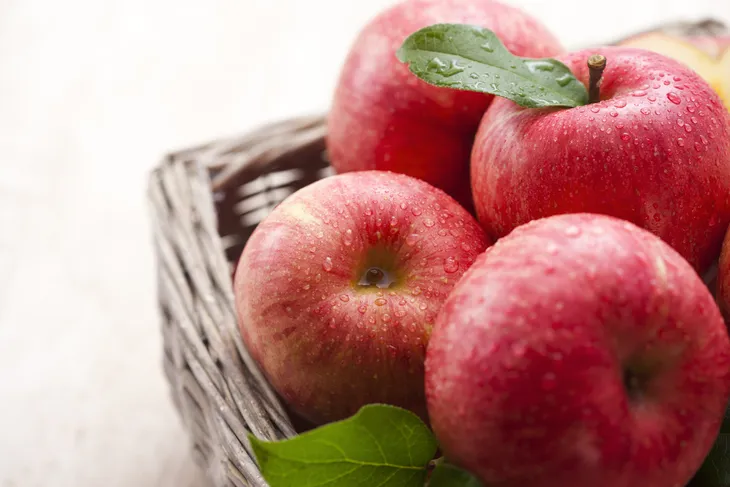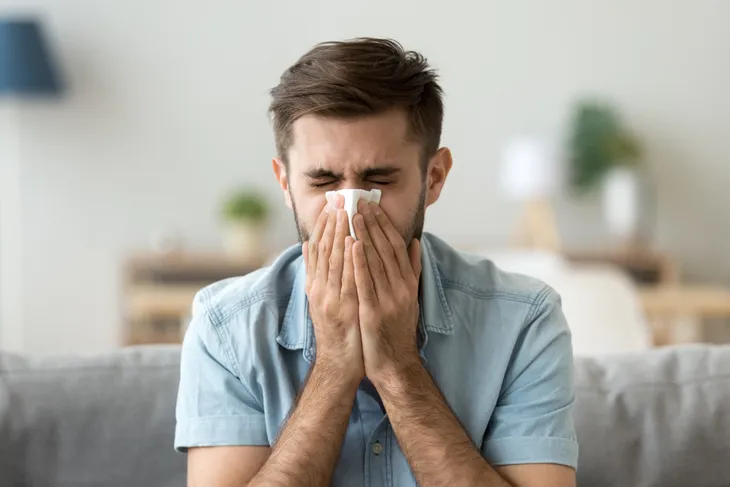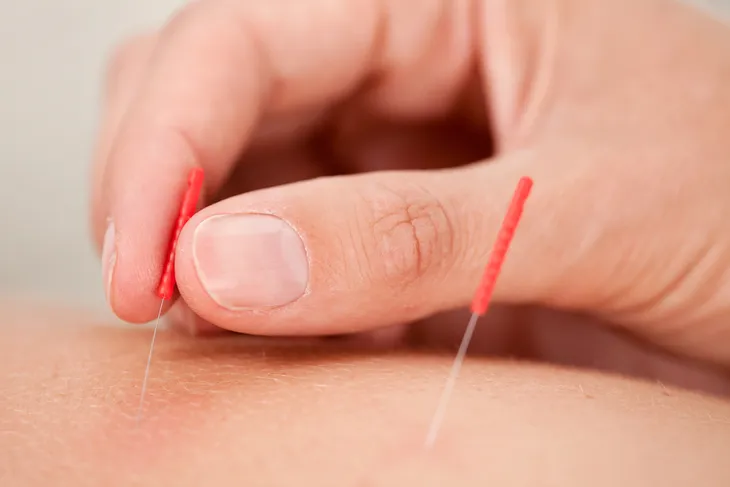Spring is a beautiful and lively time of year. Buds of plants and flowers are once again emerging in glorious bloom. We anticipate the warmer weather and longer days of spring, especially after such a cold and harsh winter, or if we suffer from the winter blues (or Seasonal Affective Disorder). However, spring’s benefits often come with a hefty and annoying price for many—particularly if you’re the victim of spring allergies with symptoms of a runny and stuffy nose; watery, bloodshot, itchy eyes; sore throat; and labored breathing.
Luckily there are ten effective ways to cope with and lessen the pain of spring allergies…
1. Clean Your Bedding
A possible cause of your spring allergy flare ups could be found in your bedding and pillow. If you realized just how dirty and allergen-infested your bed can get, you might consider sleeping on the couch tonight and buying a new mattress tomorrow. While it’s fairly well-known that mattresses are a breeding ground for dust mites and mold (ultimately causing a lot of allergies on their own), you might not realize that pollen can also become easily transferred to where you lay your head as well.
To keep pollen from sticking to your bedding, it should be cleaned regularly to ensure you don’t worsen your allergies overnight. This is especially important for pillow cases because your hair collects pollen when you’re outside and transfers to your pillow. Since allergies can cause congestion and respiratory problems, it can be difficult to get a good sleep if you’re breathing in pollen all night long. And if you have asthma, it’s even more important to keep your bedding and mattress clean. Use a pillow protector and mattress cover, and during spring allergy season, washing your body and hair right before bed can also reduce the transfer of pollen.
2. Wash Your Pets
While dog and cat owners treat their animals like part of the family, they’re a surprising cause of allergy symptoms and can trigger serious reactions. Because dogs and some cats are outdoors a lot, their fur and paws are an easy target for pollen. It’s then tracked into your house and floats from fur to air as they move around your home. The pollen gets on your floors, as well as into couches, on counters, on walls, and pretty much on every surface of your house, making it a danger zone for anyone with spring allergies.
In addition to general cleaning, give your pets a thorough bath regularly to help decrease the amount of pollen in your home. Depending on how severe your allergies are, bathing your pet every few days might be considered time consuming, but it’s an effective allergy solution. Although it’s not always possible, avoid taking pets to parks that have plants known to trigger your allergies. Many types of pollen-releasing weeds can grow in grass, so keep an eye on the environment that your pet is running around and playing in.
3. Avoid Certain Produce
Who knew that a healthy, balanced diet rich in fruits and vegetables could cause spring allergies? It seems a bit unfair that eating healthy foods could be what’s making your allergy symptoms flare up or worsen, but it can. The reason is actually quite simple—produce grows on or around trees, grass, and plants that commonly cause allergic reactions. It makes sense then that we can then become sensitive to produce as a result. An allergic reaction, known as “oral allergy syndrome”, causes symptoms of tingling and swollen lips and an itchy throat after eating produce.
The best way to lessen your allergy symptoms is to avoid things that can cause them to flare up. Since not everyone with spring allergies would react to fruits and vegetables that grow in, around, or on known allergens, figuring out if you’re sensitive to any of the produce you eat can most easily be determined by learning common triggers. For example, people allergic to birch trees can be sensitive to celery, carrots, peaches, pears and cherries, among others. In contrast, those with grass pollen allergies might have a reaction to melons, peaches, and tomatoes.
4. Increase Probiotic and Antioxidant Intake
Most people are able to change their habits and take over-the-counter or prescription medication to manage many of their allergy symptoms, However, not everyone wants to be stuck taking pills every day for several months each year. And many medications make you feel drowsy and aren’t ideal when you have to work and be alert for regular, everyday tasks. So increasing your intake of probiotics and antioxidants is a fairly easy and surprising spring allergy solution. Adding foods rich in probiotics (a microorganism) and antioxidants (a chemical molecule) can help protect and boost your immune system.
According to research from the National Institutes of Health, antioxidants can lower the risk of developing allergies, as well as help your body fight off allergens because of their anti-inflammatory properties. Likewise, probiotics have been shown to help children and adults prevent and manage all types of allergies because they help strengthen your digestive tract and are known allergy fighters that maintain a strong immune system. Plus, probiotics and antioxidants are very good for you in general, so you’ll reap many other health benefits if you try this allergy solution.
5. Reduce Stress
Stress has a seemingly endless amount of negative effects on your body, often worsening other mental and physical illnesses. This is also true for allergy symptoms. Stress can directly affect how your body reacts to and manages exposure to pollen throughout spring allergy season. This is because stress weakens your immune system, leaving your body at risk of attack from the pollen that easily gets on and into your body. Some medications and other allergy solutions might lessen your symptoms, but if you’re stressed out, your symptoms aren’t likely to go away completely.
Stress has a strange, but tight hold on how we heal, so relieving your stress levels will give you a much better chance at fighting and preventing allergy symptoms. Yoga, meditation, or even simply taking an hour to yourself can go a long way in reducing stress—and beating your allergies. The good news is, it seems more and more people understand and are aware of the impact stress can have on their lives, but it’s probably still surprising that reducing stress can also alleviate spring allergy symptoms.
6. Try Acupuncture
Even though a lot of debate exists around natural cures and treatments, acupuncture and other naturopathic treatments are part of many allergy regimes. With the availability of and easy access to medication, it’s common to jump to a drug solution first before trying something more natural (i.e., acupuncture or diet changes). Acupuncture has shown promise as a spring allergy solution because it “pinpoints” several acupuncture points that when triggered, may alleviate and even prevent allergies. The additional benefits of acupuncture, such as stress reduction, make it more than worth while.
Research published in WebMD, shows that relieving specific acupuncture points can reduce or completely eliminate runny noses, sinus pressure, coughing, sneezing, and itchy eyes. Of course, it’s always best to discuss any natural treatments with your doctor first. The frequency of acupuncture treatments will vary depending on the severity of symptoms. Acupuncture alone may not cure you, but it can help reduce the quantity and frequency of medication. And if you experience side effects from allergy medication, but need it because of severe allergy symptoms, acupuncture may help alleviate side effects as well.
7. Eat Spicy Foods
It’s fairly well known that many spices are good for your body and overall health. Eating spicy food is often recommended to help with the common cold, temporarily breaking up congestion and a stuffy nose. But eating spicy foods can do even more than help you through a virus. Spices are also an effective, delicious, and surprising spring allergy solution too. Spicy food can thin the mucous that builds up and clears your nasal passages. This offers great relief for people whose allergies cause sinus congestion and pressure.
Turmeric is a spice used in many Indian curry dishes, and it contains strong anti-inflammatory properties that can help reduce allergy symptoms. When your sinuses and nasal passages become congested, it’s often the result of inflammation, making turmeric the perfect spice to add to your diet. Anyone who suffers from allergies knows that a congested respiratory system makes it difficult to sleep, exercise, and do normal, everyday things like climbing the stairs. Altering your diet to include spicy food is an easy and safe way to find relief from these spring allergy difficulties.
8. Close Your Windows
There’s nothing like the first warm day of spring. You’re able to open your windows and let the fresh air in after a long, cold winter. Fresh air will get rid of the stale, dry air from furnaces, but it can also be a major trigger for people who suffer from spring allergies. Although many people find closing their windows obvious, not everyone understands just how much pollen gets into the house via open windows.
Now this doesn’t necessarily mean you’ll have to keep your windows closed throughout the whole season. However, if you suffer from allergies in spring you can benefit from closing your windows during peak pollen hours—typically in the morning and on windy days. The morning is one of the worst times for pollen while windy days blow pollen around, infiltrating the nice breeze. If you leave your windows open during these times, it’s inevitable that pollen will get through even if you have a screen. So open your windows late morning or around mid-day to avoid your house becoming filled with pollen, and keep them shut when there’s a strong breeze.
9. Wear Sunglasses
The sun’s rays can be very harmful on your eyes and so it’s common to wear proper sunglasses that have UV protection. Sunglasses help you see when driving on a sunny day and prevent straining your eyes when out in the sun. But on top of this, spring allergy sufferers have the somewhat surprising added benefit of reducing allergy symptoms when wearing sunglasses outside. Allergy symptoms that occur in the eyes can be quite severe, so protecting the eyes from harmful allergens in the air can make a big difference in how you feel during allergy season.
When you’re outside and your eyes aren’t protected by sunglasses, pollen can easily get into the eyes and stick to the eyelids, causing a variety of uncomfortable symptoms like itchy, dry, watery, and bloodshot eyes. Reducing allergy symptoms that usually occur in the eyes also lowers the risk of being sensitive to light—when your eyes are irritated, light can be blinding and painful to cope with. It’s not a bad idea to rinse your eyes after coming indoors. Use natural tear drops to cleanse the eyes just in case some pollen got behind your sunglasses.
10. Cut Back on Alcohol
Those who enjoy having drinks—especially on a restaurant patio or a back deck as the weather improves—aren’t going to like this allergen solution. However, cutting back on alcohol come spring may reduce your allergies. According to the Mayo Clinic, there are a few known allergens in alcohol, including chemicals, grains, and preservatives. While these allergens aren’t directly related to the change in weather and the increase of pollen, there’s still a surprising connection between spring allergies and drinking alcohol.
Although reducing your alcohol intake can be an effective allergy solution, it isn’t actually dependent on the weather or time of year. Some people notice a change in their allergies during spring and assume it’s related to pollen, but instead it could be the result of increased drinking as the weather warms up. For people who suffer with spring allergies, it’s worth cutting back on alcohol to see how you feel. You might not have a severe allergy to pollen or alcohol, but even mild allergies can be disruptive and the combination of 2 mild allergens can take its toll on your body.













